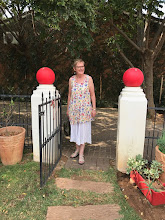
"Life changes fast. Life changes in the instant. You sit down to dinner and life as you know ends."
These are the opening lines of Joan Didion's honest and lucid record of her experience of the first year following the loss of her beloved husband, John Gregory Dunne. A year complicated by the mysterious illness of her only daughter, Qintana. A year when her own mourning had to be partly shelved as she waited outside the ICU ward where her daughter lay desperately ill and Didion negotiated medical terminology with the usual hurried and harried medical staff. A year when she re-visited her marriage before finally letting it go.
This remarkable book has a special place with four other slim volumnes on my book shelf in a section I think of, without self-pity or regret, as my Grief Library. When I lost my husband of 31 years somewhat over five years ago, part of my healing lay in sharing, word for word, the experiences of others. At a time when I could not concentrate on a phone number, let alone a movie or a novel, authors in my Grief Library were my faithful companions through the valley.
Joan Didion describes that year of intense emotion as the year of magical thinking. She, like a select few other literary alchemists (Alan Paton, CS Lewis, Emily Dickinson and Thomas Hardy, to mention a few) has the artistry to transform her grief into beauty, into art, into a memorial of words. At first I could not grasp the significance of her title; then I agreed. "Oh, yes, Joan. A year of dreadfullly sharpened awareness! You are right! A cuppa un-shared, a book, a movie, a sermon un-discussed. A joke, a rose opened in Thatchwick's garden, a tumble with the dogs, a rainstorm takes on a bleakness as well as a luminosity, when suddenly you are alone."
Am I becoming maudlin?
So let me return to the inimitable journalist, essayist and novelist, Joan Didion. She was born in California in 1934 and she lives in New York. Her style is distinctive: cool, economical, not an adjective wasted. She seems detached and icy even but underneath her pain is naked. Winston Churchill described the "essential structure of the English sentence as a noble thing." He would have approved of Didion's writing.
A postscript on her book is that her daughter passed away in 2005 at age 29 although she appeared to be recovering during the period that the book covered. Vanessa Regrave, a friend of Didion, stars in the one woman Broadway play. I think I could fly to New York just to see that.




















